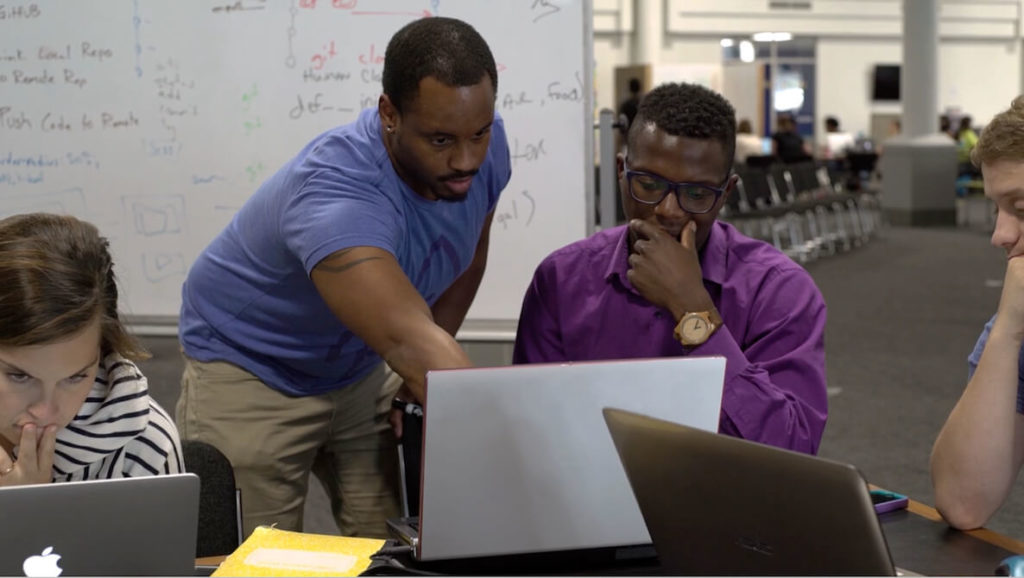In 2016, Kimberly Vaughn was looking to make a career change. The single mother from St. Louis had been hit hard by her divorce and the recession in 2008. Though she had a degree in criminal justice, she had transitioned from social work to working in insurance in an effort to make more money and provide for her family.
But she longed to find a career that she was passionate about, one where she could earn more and set an example for her two daughters.
“There was no trajectory where my life was going to change,” Vaughn says. “I call it the tornado, like you’re in this cycle where you’re not going to get out.”
She began to wonder if she should seek out a job in tech. After all, it was a burgeoning, fast-paced sector—the market is expected to reach $5 trillion in value by the end of 2021. Her brother worked in the tech industry and she knew from his experience that the work was exciting and that it paid well. She started searching for training programs, eventually stumbling upon CoderGirl and taking workshops with them. That program, it turned out, was an initiative of LaunchCode, a St. Louis-based nonprofit that provides free coding and web development training and paid apprenticeships with tech companies to those looking to work in tech. Her brother had also actually recommended their program to her, and she wound up enrolling.
MORE SKILLS-TRAINING PROGRAMS IN PHILADELPHIA
Now, she works as an information security analyst for the Federal Reserve, a job she’s held for the past five years.
“I can say, without a doubt, that my life wouldn’t be what it was [without LaunchCode],” she says. “It’s like 180 degrees.”
Now, LaunchCode has come to Philly; the first cohort of 150 students began taking classes in June. The nonprofit is focused on keeping tech businesses in Philly, increasing diversity within the city’s tech industry, and creating more high-wage job opportunities by providing people with free tech education and placing them in apprenticeships with companies. Though the city already has tech training programs, LaunchCode’s ability to train at least 150 people per year could help stimulate growth in the city’s tech sector, bringing more high-wage jobs to the city.
Fueling the pipeline

LaunchCode was founded in 2013 by Jim McKelvey, co-founder of the financial payments company Square. McKelvey founded the nonprofit in response to a problem he had when he was first starting Square with Twitter CEO Jack Dorsey: There wasn’t enough tech talent to keep the company in his hometown of St. Louis, Missouri.
Though McKelvey wanted to keep the company headquartered in St. Louis, he wasn’t able to hire developers fast enough to meet the needs of the growing company. Eventually, Square moved to Silicon Valley, but McKelvey never forgot the talent shortage he faced in the early days.
“For him, that planted the seed of LaunchCode,” says the nonprofit’s executive director, Jeff Mazur. “How do you create a program that solves this really acute business problem around the need for tech talent?”
“Philadelphia is really growing into a tech hub of our own,” Gunther says. “The space for LaunchCode to come in and be able to educate individuals for free and really think about creating a pipeline from the community into those roles was really clear from a social impact standpoint.”
These problems aren’t unique to St. Louis. In Philly, dozens of startups leave the city every year in venture-backed exits due to a variety of funding and talent challenges. In 2020, 19 businesses left the city in venture-backed exits, according to a venture report from the Philadelphia Alliance for Capital and Technologies (PACT) .
LaunchCode helps close the tech talent gap and keep businesses in the cities they were founded in by training people in essential skills like coding, web development basics and employment prep. The Philadelphia program is being led by Keighan Gunther, assistant vice president of LaunchCode Philadelphia. Gunther previously worked in the nonprofit space as director of post-secondary opportunities and supportive services at JEVS Human Services.
“We’re really able to say you have a passion for it, if you have the drive and you’re willing to come to class, we can work together to make this sort of opportunity [happen],” Gunther says.
LaunchCode 101
LaunchCode takes on students from a variety of backgrounds and skill levels. People interested in the program can take a brief quiz on the LaunchCode site to determine what skills they need and then take courses and workshops, like LaunchCode 101, leaving them with a wide range of coding and web development skills that are in demand from employers.
The course meets part-time in the evenings over a 20-week period so that participants can work while enrolled in the courses. The first 10 weeks of the course cover web development using JavaScript and the next 10 focus on back-end web development in either Java or the programming language C#.
Each week has two three-hour class meetings where students work with an instructor in small or large groups. In Philly, classes are being held from 6 to 9pm on Mondays and Thursdays. Courses are typically held in-person, but due to Covid-19, the first course in Philadelphia is being held virtually.
“Most of our employers look at their workforce and most [of their] people look like me—white guys in their 20s or 30s,” Gunther says.
After completing the free course, students are matched with one of the nonprofit’s employer partners, where they have the opportunity to be interviewed for an apprenticeship. During the apprenticeships, LaunchCode pays the hourly wage for the participant though many go on to become full-time employees thereafter. Employer partners pay LaunchCode for bringing in apprentices, which allows LaunchCode to fund their training programs and offer wages to apprentices. The costs that aren’t covered by employer partners are funded through donations.
The organization has a variety of local and national partners offering apprenticeships, including Microsoft, Boeing and Mastercard. Locally, they’re working with Vanguard, Fishtown Analytics and Crossbeam, among others.
So far, the program has placed over 2,300 people in jobs across their St. Louis and Kansas City locations. While the first Philadelphia class is already underway, LaunchCode anticipates launching another local course next spring. Eventually, they hope to be able to offer two classes per year.
Why Philadelphia?

Philadelphia is the third city in which LaunchCode is active. The organization came to our city after evaluating the job market and digital skills gap. Their leap into the city is supported by the Philadelphia Schools Partnership (PSP), which raised $400,000 from donors and gave the money to LaunchCode in the form of a startup grant. PACT has also supported their launch by contributing funds to the grant and helping LaunchCode make connections to employer partners within the city.
“I’m excited about the work that Keighan and his team are doing because what they do every day is spend hours and hours having that conversation, talking to those employers and making sure that they have what they need so that we can see the model flourish in Philadelphia,” Mazur says.
“Now, employers are thinking, I’m going to need to get out for new junior developers and I really want to make sure that they actually are reflective of Philadelphia.”
While tech jobs accounted for only 4.4 percent of Philly’s economy in 2019, Gunther and Mazur say there are huge opportunities for growth, and that many tech jobs in the city remain unfilled due to skill gaps in the labor force. The nonprofit points to Glassdoor job listings—Philly had nearly 6,000 openings for tech jobs in November of 2020—as proof that the tech sector in the city has potential for growth.
“Philadelphia is really growing into a tech hub of our own,” Gunther says. “The space for LaunchCode to come in and be able to educate individuals for free and really think about creating a pipeline from the community into those roles was really clear from a social impact standpoint.”
LaunchCode isn’t the only tech training program in the city. Meetup groups like Philly Tech Sistas are helping people develop tech skills and the Camden non-profit Hopeworks has been training and placing young people in tech jobs through their classes and pipeline programs since 2000.
Moving the needle on job equity and regional poverty
Having multiple tech training programs in the city isn’t a bad thing. In fact, it may be necessary to help move the needle on regional poverty in the area. Most of Philly’s job growth is in the low-wage sector, according to a 2019 report. Defined as jobs that pay $35,000 per year or less, jobs in the low-wage sector make it difficult for people to support themselves and their families. In contrast, tech jobs in the city pay an average of over $68,000, according to Glassdoor statistics.
Growing the tech sector in the city means little if it’s not done equitably, however. And part of LaunchCode’s mission is not just growing Philly’s tech ecosystem, but also diversifying it.
 LaunchCode’s classes are 70 percent people of color and 56 percent of their participants come from households earning less than $30,000 a year. In Philly, their cohort is 47 percent women, 47 percent men and 6 percent non-binary people. The program attracts people of all ages—from those in their 20s looking to launch their careers to those in their 30s and 40s who are looking to make a career change. Gunther says that their oldest participant is in their 60s.
LaunchCode’s classes are 70 percent people of color and 56 percent of their participants come from households earning less than $30,000 a year. In Philly, their cohort is 47 percent women, 47 percent men and 6 percent non-binary people. The program attracts people of all ages—from those in their 20s looking to launch their careers to those in their 30s and 40s who are looking to make a career change. Gunther says that their oldest participant is in their 60s.
To recruit participants that are representative of the city’s diversity, LaunchCode’s Philadelphia team spent time traveling around the city doing program outreach at local colleges and community organizations. They’ve also promoted the program through social media.
In an industry where in 2019 only 5.8 percent of software developers in the U.S. were Black and 5.1 percent were Hispanic, training programs have to consider how they can bring diverse groups of people into tech in order to make the sector reflective of the cities where their companies are headquartered.
“Most of our employers look at their workforce and most [of their] people look like me—white guys in their 20s or 30s,” Gunther says.
“Now, employers are thinking, I’m going to need to get out for new junior developers and I really want to make sure that they actually are reflective of Philadelphia. We have been really proud to be a part of that solution specifically.”
The Citizen is one of more than 20 news organizations producing Broke in Philly, a collaborative reporting project on solutions to poverty and the city’s push towards economic mobility. Follow the project on Twitter @BrokeInPhilly.
Header photo courtesy of LaunchCode



